How Israel's Iran strikes could change everything for America
The best-case to worst-case scenarios
US Mideast envoy Steve Witkoff was supposed to be in Oman last weekend, sitting across from Iranian negotiators and discussing Iran’s nuclear program. Instead, the talks were canceled after Israeli warplanes carried out the most extensive bombing campaign against the Islamic Republic of Iran in its 46-year history.
Israeli forces systematically targeted Iranian nuclear facilities, which Tehran says are used to make reactor fuel, but many fear are part of a weapons program. Israel also attacked Iran’s military command centers and key personnel across multiple provinces. Among the dead were the regime’s top military officials — General Hossein Salami, commander of Iran’s Revolutionary Guards, and Mohammad Bagheri, the military chief of staff — and at least two nuclear weapons experts whom Israel describes as Iran's "principal bomb-makers."
According to Israeli officials, this was just the opening salvo of what could become a weeks-long campaign. And Israel indeed followed up with more strikes in the following days, targeting Iran’s oil and gas industry and its state TV network — while an anchor was on the air.
Israel's timing wasn't coincidental. After spending a year decimating Hamas in Gaza and crippling Hezbollah in Lebanon, Netanyahu saw a rare window to strike Iran's nuclear facilities without facing coordinated retaliation from Iran’s proxy militias. The opportunity became urgent last week when the International Atomic Energy Agency issued its first censure of Iran in almost 20 years. It determined that Tehran was brazenly violating its Nuclear Non-Proliferation Treaty obligations, which require it to forgo developing nuclear weapons and cooperate fully with IAEA monitoring and inspections.
Iran's furious response — announcing plans for a new enrichment site in a "secure" location — was essentially a middle finger to the international community and a clear signal that the regime was abandoning all pretense of civilian nuclear use. For Netanyahu, this was the moment: strike before Iran's proxies recovered, and before its nuclear program advanced beyond the point of no return.
Salami had declared just days before his death, when reports surfaced about a possible Israeli attack, that Iran was "ready for war" and had already selected its targets. He promised retaliation that would be "more painful and more destructive" than Iranian missile strikes against Israel in April and October 2024. Now he's gone, along with much of Iran's military leadership. Supreme Leader Ayatollah Ali Khamenei's regime, cornered and humiliated, faces the kind of existential crisis that makes desperate measures seem rational.
Iran's retaliation began within 72 hours and exceeded even the most pessimistic Pentagon assessments. In the largest coordinated assault in its history, the Islamic Republic launched over 400 ballistic and cruise missiles at Israeli cities, military bases, and critical infrastructure. Unlike the previous attacks, which were largely intercepted or caused minimal damage, this barrage overwhelmed Israeli air defenses at multiple points.
Tel Aviv's Ben Gurion Airport was forced to shut down after missile fragments damaged runways, while power grids across northern Israel flickered offline as Iranian missiles struck electrical substations. Early casualty reports suggest at least 60 Israelis were killed and hundreds wounded — the deadliest single day for Israeli civilians since the October 7 attacks.
But Iran didn't stop there. Within hours of the missile barrage, three drones were launched toward the Al-Asad Airbase, which hosts US and Iraqi military personnel in western Iraq. No group has claimed responsibility, but Iran maintains relationships with Shiite militias in Iraq and Syria that have previously attacked US bases using drones and rockets, and the attack on Al-Asad bore their signature. While the US successfully shot down all three drones before they reached their targets, the assault was a dangerous escalation that risked drawing America directly into the Iran–Israel conflict. Iran was demonstrating that it considered American military assets across the region fair game.
Now, President Trump finds himself managing a crisis he didn't create but can't escape.
How America gets dragged into the war
Even Iran has conceded that Israel has inflicted significant damage to some of its key nuclear and missile sites. But much of Iran’s nuclear facilities are underground. This includes the Fordow plant, built deep deep inside a mountain and protected by strong air defenses, where uranium is enriched up to 60% — well on the way to the 90% considered weapons-grade. The consensus among current and former Israeli officials I have spoken to is that Israel does not have the capability to destroy Iran’s underground nuclear facilities, including Fordow, without help from the US in the form of so-called bunker-buster bombs and B-2 bombers.
So far, Washington has not agreed to provide that type of assistance. But this is not just another Middle Eastern conflict that Americans can ignore. The escalating confrontation between Israel and Iran threatens to reshape global economics, drag US forces into combat, and potentially bring violence to American soil in ways that will touch every household.
The economic impact is already visible. Oil prices surged 12 percent last week, and energy analysts predict gasoline could rise 20 cents per gallon in coming weeks. But that's nothing compared with what could happen if Iran follows through on its threat to close the Strait of Hormuz — the 21-mile-wide waterway separating Iran from the Arabian Peninsula through which nearly 30 percent of the world’s oil flows.
Meanwhile, roughly 40,000 American military personnel are stationed across the Middle East, many within range of Iran's still considerable missile arsenal. The Pentagon has already begun evacuating some diplomatic staff from Baghdad and military families from Gulf bases — a clear signal that officials expect Iranian retaliation against American targets. Iran has explicitly threatened to strike American bases if the US supports Israel by attacking its nuclear facilities. Every American soldier in the region is a potential target.
Most of the scenarios of how Iran might respond paint a grim picture of how quickly this regional conflict could metastasize into something that directly threatens American lives and livelihoods. Each carries enormous risks, and none of the likely outcomes spare American families from serious consequences.
Iran's missile barrage could overwhelm Israeli defenses
As of this weekend, Iran was estimated to have approximately 2,000 ballistic missiles left that are capable of reaching Israel, many carrying warheads with 2,000 pounds or more of explosives. Since October 2024, Iran has ramped up production to roughly 50 missiles per month, pursuing what US officials describe as a strategy to produce more ballistic missiles than the number of Israeli missile defense interceptors.
If Iran launches additional coordinated attacks involving several hundred missiles, Israeli air defenses could again be saturated despite US missile defense systems positioned to help. A successful barrage could kill hundreds of Israelis and destroy critical infrastructure.
Sustained Israeli casualties would place enormous pressure on Trump to authorize direct US military intervention beyond shooting down incoming Iranian missiles. American naval vessels in the region have missile defense capabilities, but protecting Israel from sustained attack would require sustained American engagement. Trump would face a choice between abandoning America's closest Middle Eastern ally and entering a shooting war with Iran.
Iran could close the Strait of Hormuz
Iran's most powerful economic weapon is its ability to disrupt global energy markets by blocking the Strait of Hormuz.
The US Navy would likely move to reopen the strait, but doing so would require direct military confrontation with Iranian forces. Combat operations in the shallow, confined waters of the Persian Gulf would put American sailors at maximum risk from Iran's anti-ship missiles and small boat swarms. Success would require a military commitment that could last months.
Iranian proxies could attack US forces
A coordinated campaign by Iranian proxies, like Hezbollah or the Houthis, could target US facilities in Iraq, Syria, Jordan, and the Gulf states simultaneously. Unlike direct Iranian attacks, proxy warfare allows Tehran to maintain plausible deniability while inflicting casualties on American forces. US troops would find themselves under constant threat, spending significant time in bunkers while air defenses attempted to intercept incoming munitions.
Trump would face pressure to retaliate against Iran directly rather than play whack-a-mole with individual militia groups. But striking Iranian territory would risk the broader war that proxy warfare is designed to avoid, potentially drawing the US into exactly the kind of endless Middle East conflict Trump has always promised to avoid.
Iran could go for the nuke
The most dangerous scenario involves Iran abandoning all restraint and racing toward nuclear-weapon capabilities. Current estimates suggest Iran could produce enough highly enriched uranium for multiple nuclear weapons within two to three months if it chose to ignore international agreements entirely.
Iranian hardliners are already questioning why the country has bothered with international legal restrictions like the Nuclear Non-proliferation Treaty given that previous compliance gained it nothing in sanctions relief or international legitimacy. Former Deputy Assistant Secretary of Defense Daniel Shapiro warned that Iran would “likely make a desperate run” toward building an atomic weapon.
A nuclear-armed Iran would fundamentally alter the Middle East, potentially triggering nuclear proliferation among Arab states and creating permanent instability. Trump would face a grave test: whether to use military force to prevent Iranian nuclear weapons or accept a nuclear-armed adversary that could threaten American allies and interests indefinitely.
Terrorism could come to American shores
Perhaps the most unpredictable scenario involves terrorist attacks on US soil. Iran's expansive proxy network create multiple pathways for retaliation against American civilians, at home or abroad.
A major terrorist attack inside the United States — whether directly connected to Iran or simply blamed on the regime — could trigger post-9/11-style political dynamics that sweep away diplomatic nuance. Such an attack would likely produce overwhelming public pressure for military retaliation against Iran, potentially including the kind of regime-change operation that Trump's base firmly opposes. The president who vowed to end endless wars could find himself launching the largest Middle Eastern intervention since the Iraq War.
Best-case scenario
The one scenario that doesn't end in regional catastrophe involves Iran swallowing its pride and returning to nuclear negotiations — but President Trump abruptly departed the G7 meetings, and told reporters aboard Air Force One that he was not interested in negotiating for a cease-fire. “I’m not too much in the mood to negotiate,” he said, adding that he wanted a “real end,” and not a cease-fire.
Arab sources say Iran has signaled it wanted to resume nuclear talks with the United States, provided the US does not join the Israeli military campaign. But if that were the case, Tehran would come to the table from a humiliated position, with its nuclear scientists dead, its facilities destroyed, and its proxy network degraded. Negotiating after military defeat would signal weakness to both domestic hardliners and regional rivals, potentially undermining the regime's credibility at home.
But Trump's calculated ambiguity about American support — he has both emphasized that America is not participating in the Israeli campaign and declined to sign a statement calling for both sides to de-escalate — gives Iran's leadership a face-saving off-ramp: they're not capitulating to Israel alone but responding to pressure from the world's dominant superpower. The prospect of facing the combined military might of both countries might be the only force powerful enough to drag Iranian negotiators back to the table and lead them to choose diplomacy over destruction.
Where this is headed
Each scenario presents Trump with choices that pit his campaign promises against geopolitical realities. His base wants him to avoid Middle Eastern wars, but abandoning Israel or allowing Iran to acquire nuclear weapons would shatter his credibility as a global leader and his image of strength.
The economic consequences alone could define Trump's second term. Sustained high energy prices would fuel inflation, potentially triggering recession and undermining the economic growth Trump has promised.
These scenarios also test whether Trump can manage the contradictions in his foreign policy approach. He craved the diplomatic breakthrough with Iran that might have earned him a Nobel Peace Prize, something he’s said he wants, but his administration provided Israel with the weapons that, for now, have made diplomacy impossible. He promised to put America first while accepting an obligation to an ally, Israel, that serves its strategic agenda at least as much as his own.
The next few weeks will determine whether Netanyahu's calculated gamble becomes Trump's inherited nightmare and the president who vowed to be a "peacemaker and unifier" finds himself managing the deadliest Middle Eastern conflict in decades. For ordinary Americans, the stakes are high: their economic security, their physical safety, and the global stability that underpins both hang in the balance as missiles fly across the Middle East.
This isn't about foreign policy abstractions — it's about whether you can afford to fill up your gas tank next month and whether American soldiers come home safely. Trump promised to end endless wars, but he may have just inherited the biggest one yet — one in which the US could commit to flying its planes to drop massive bunker-busting bombs on Iran.



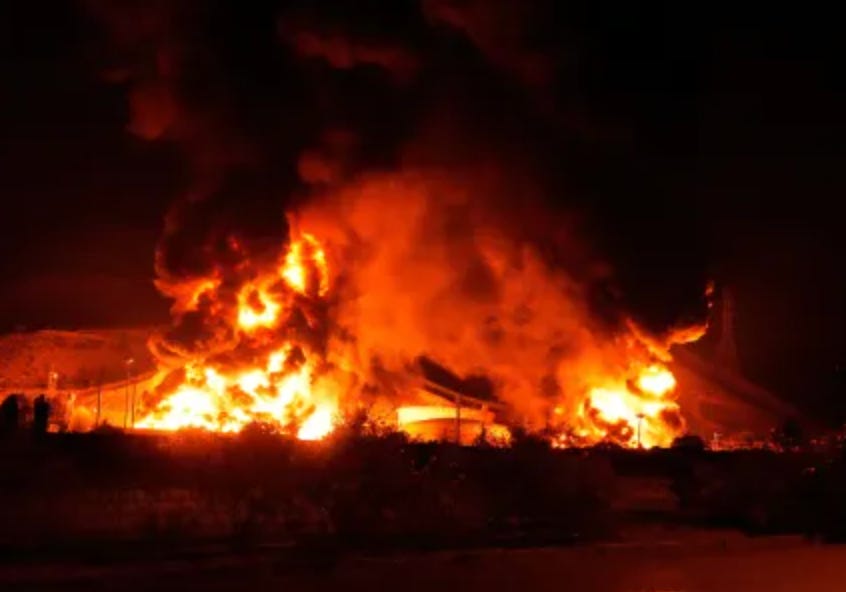
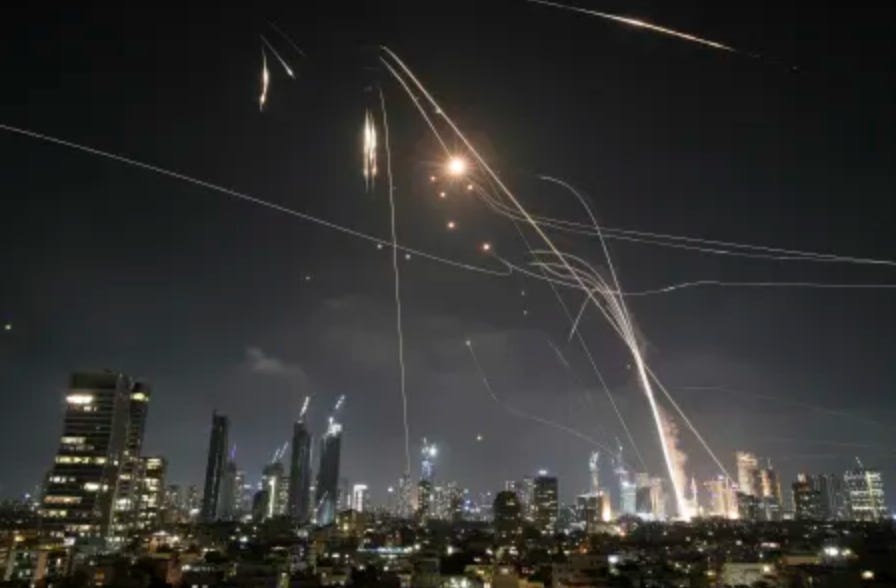
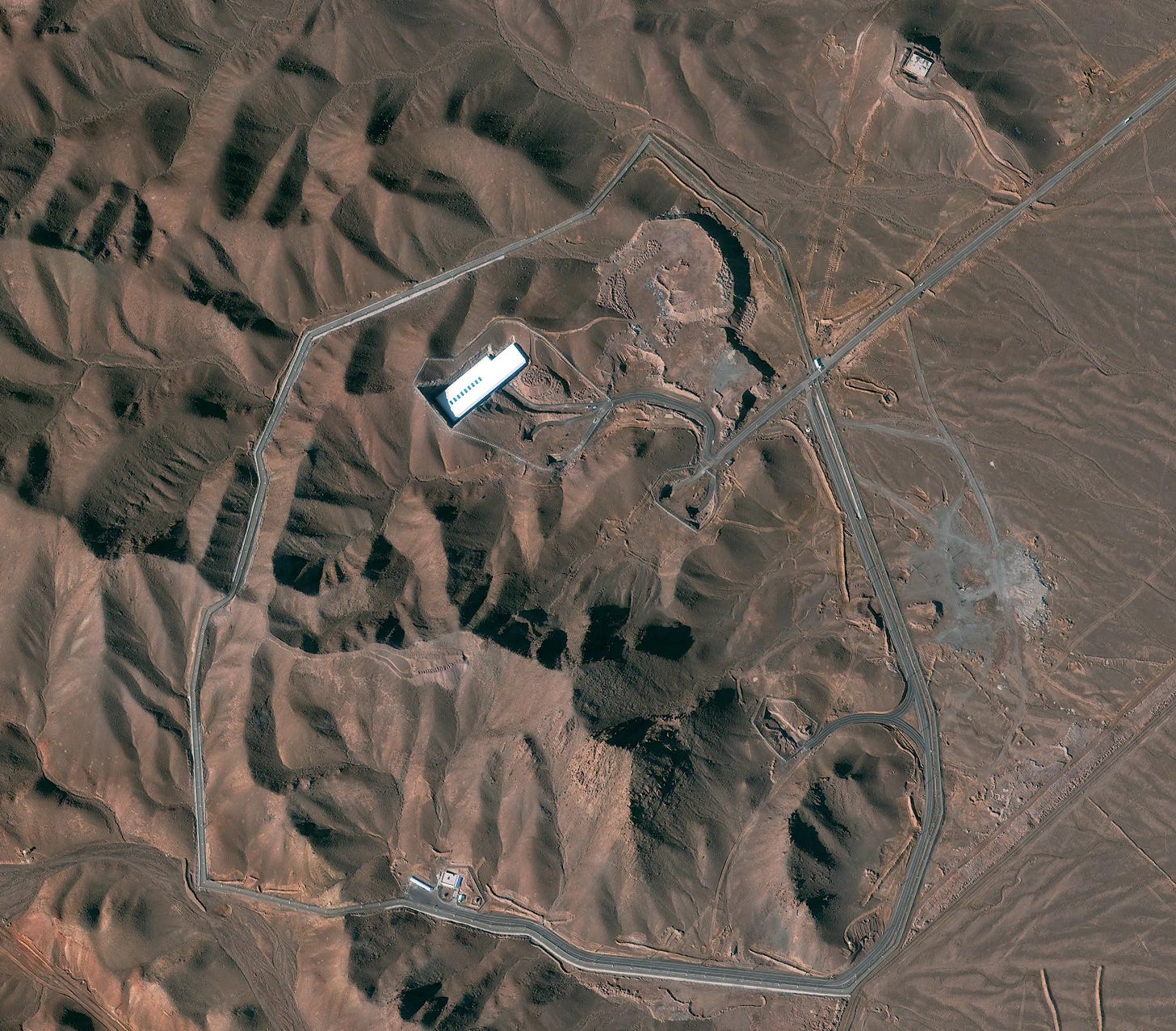
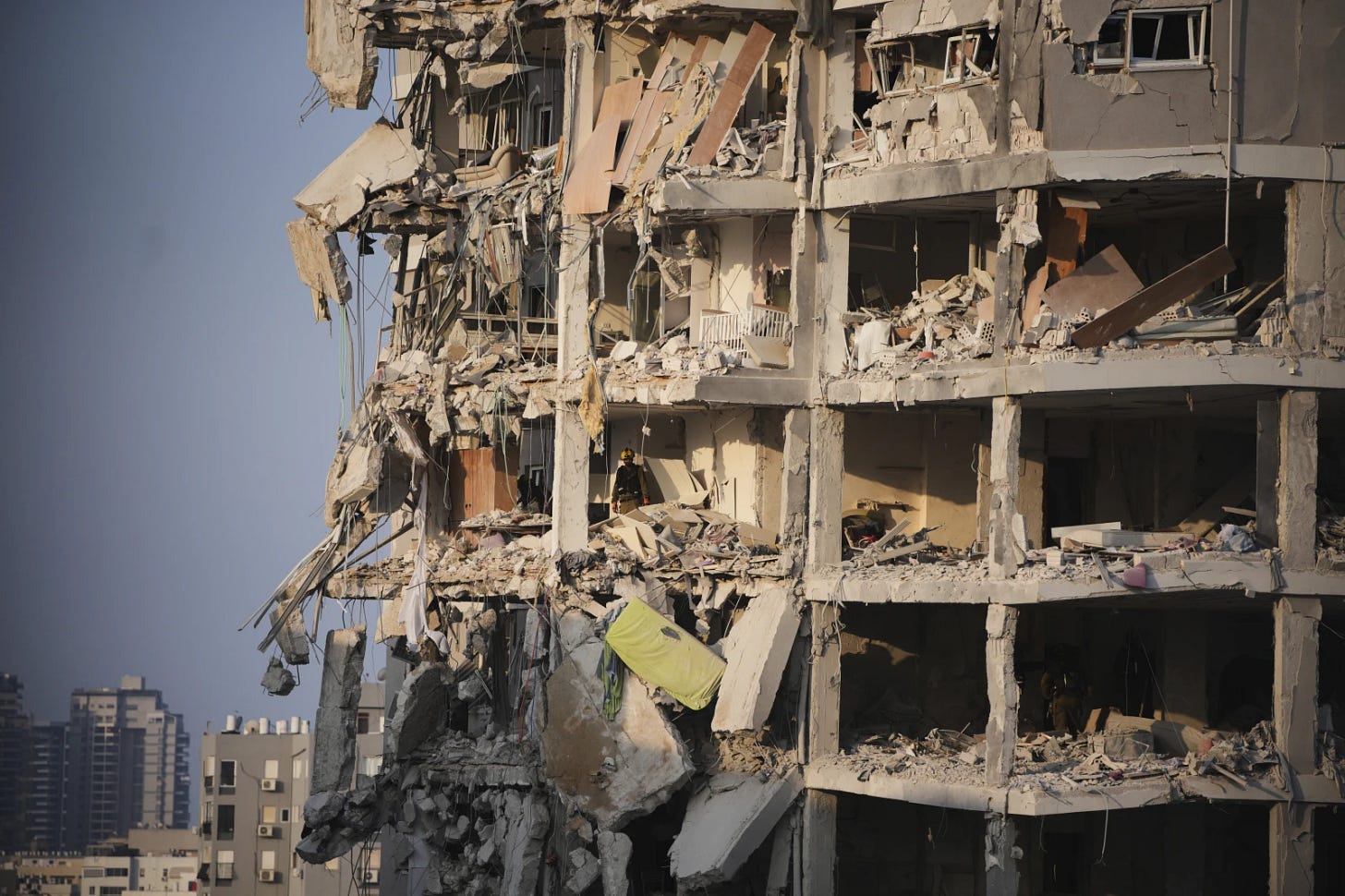
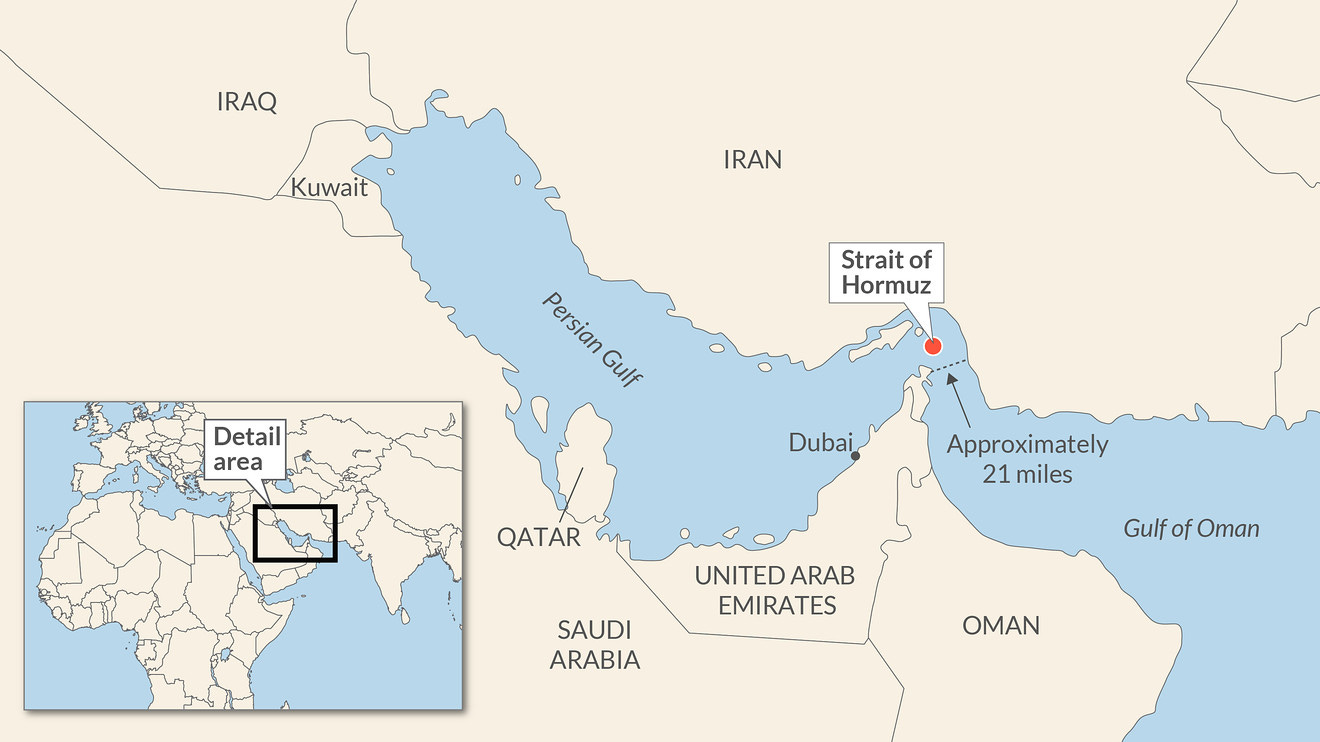
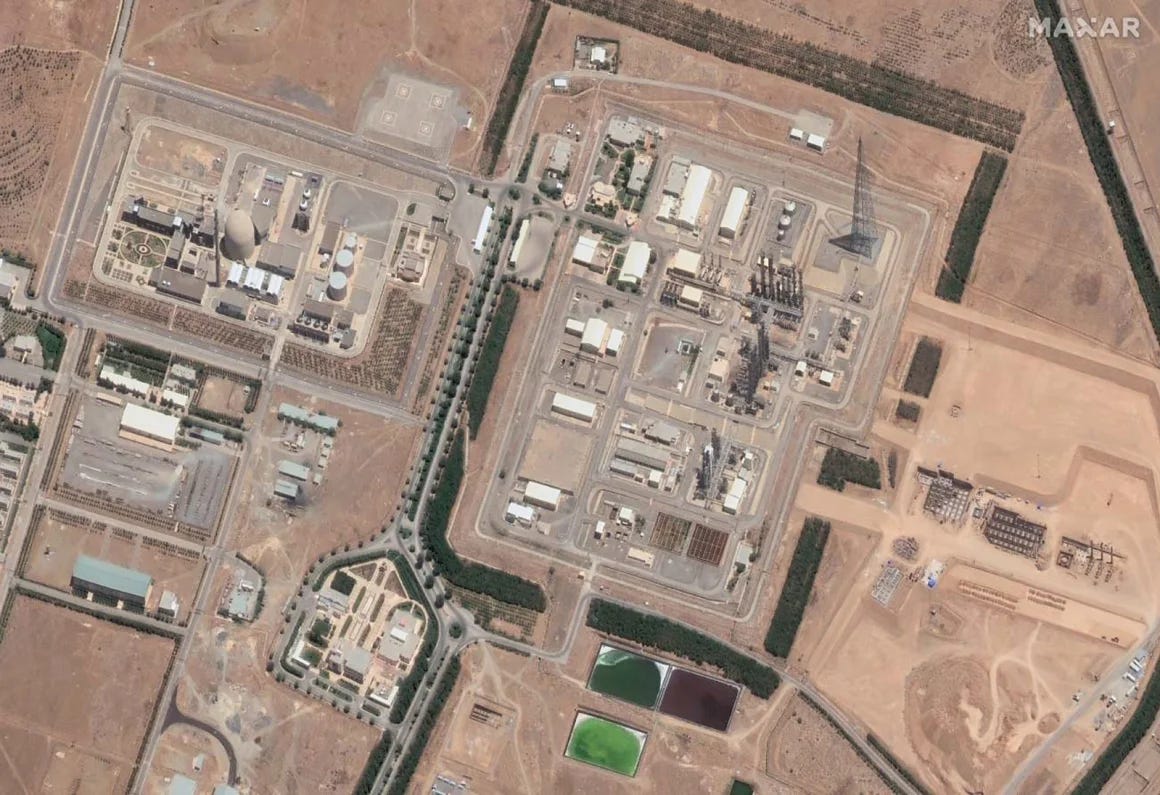
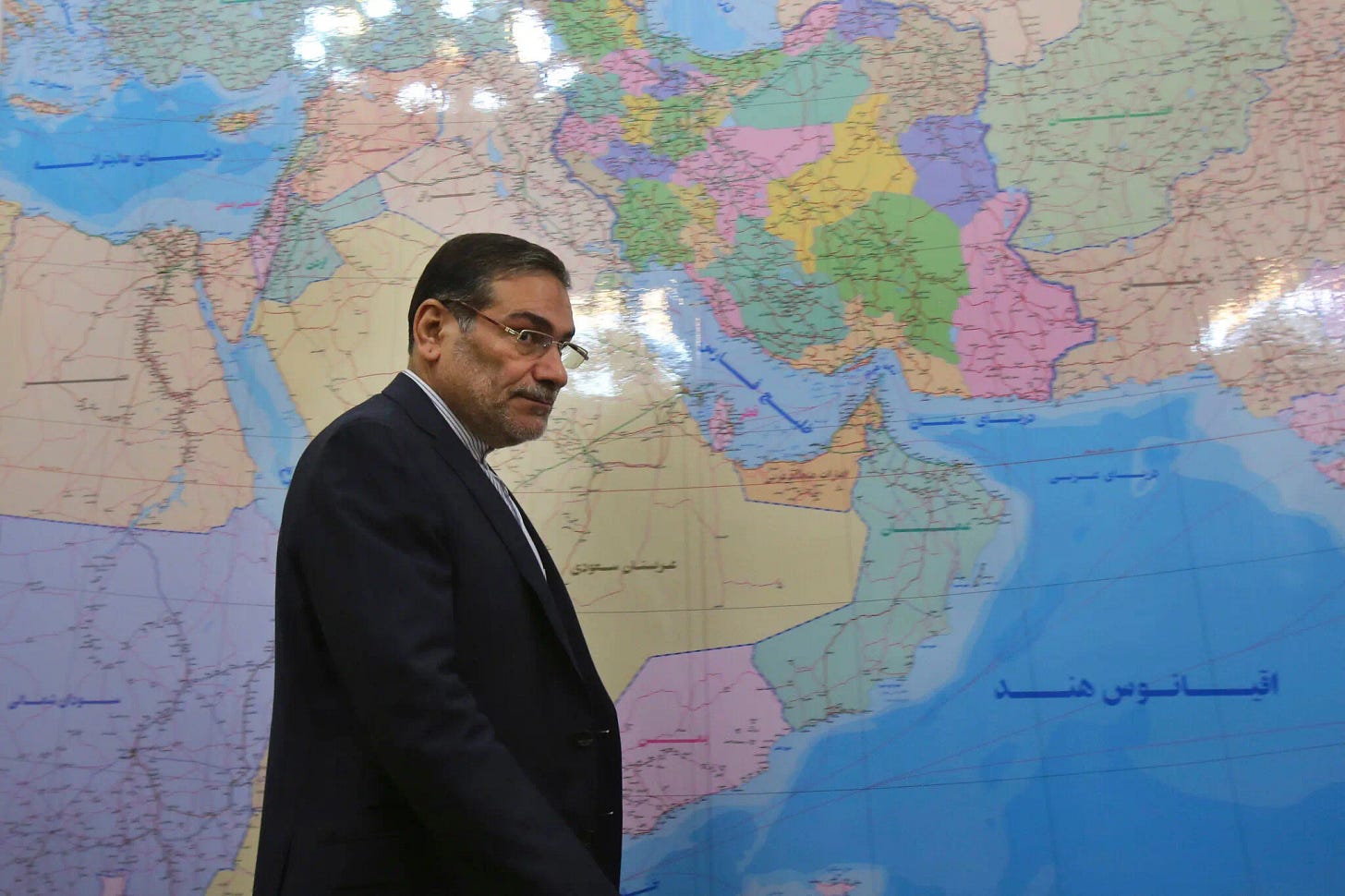

Ok yeah I think I'm done paying for this neocon stenography. In all the handwringing about potential Israeli losses, nowhere is it mentioned that at least 224 Iranians have already been killed so far, overwhelmingly civilians including children. Netanyahu's actions in Gaza are described as "crippling Hamas" rather than carrying on a sustained campaign of deliberate starvation of the civilian population (again, many children) and allowing snipers to target desperate people looking for food, bombing indiscriminately, etc. It's a genocide, not a "calculated" military action.
Also who is this President Trump you're describing? This sober leader struggling to avoid conflict, keep campaign promises, and follow a thoughtful strategy in the Middle East? That's not the colossally stupid and trigger-happy fool we've all watched for the last 10 years. He's not the man for this moment and every honest person knows it.
Anyway, Iranians are people too, and this perspective on a potential war and its impact to oil prices in the US is some 90s-2000s-era BS. Do better.
Thank you for another helpful post. Some commenters clearly missed the title of this article stating “How Israel’s Iran strikes could change everything for AMERICA”. This post was designated as a discussion about how these events would likely impact Americans right from the start. The likely scenarios include high gas prices. So its place in this article makes more sense than delving in to the effects for civilians in Iran, as horrific as those are. This is one article in a sea of past writings coming from the Preamble as well as the many still expected to come. Don’t whine over ONE post not including every single issue you feel needs to be included when the article tells you what it will be about. Sharon has always given us considered, balanced, nuanced posts. If you believe she or her team don’t cover the heart-breaking realities for the innocent people in Gaza or elsewhere, you clearly don’t engage with her posts consistently. In a time where finding unbiased, non-sensationalist and ACCURATE updates is difficult, don’t crack it at the few people working overtime to provide us this because one post wasn’t exactly how you would have written it.